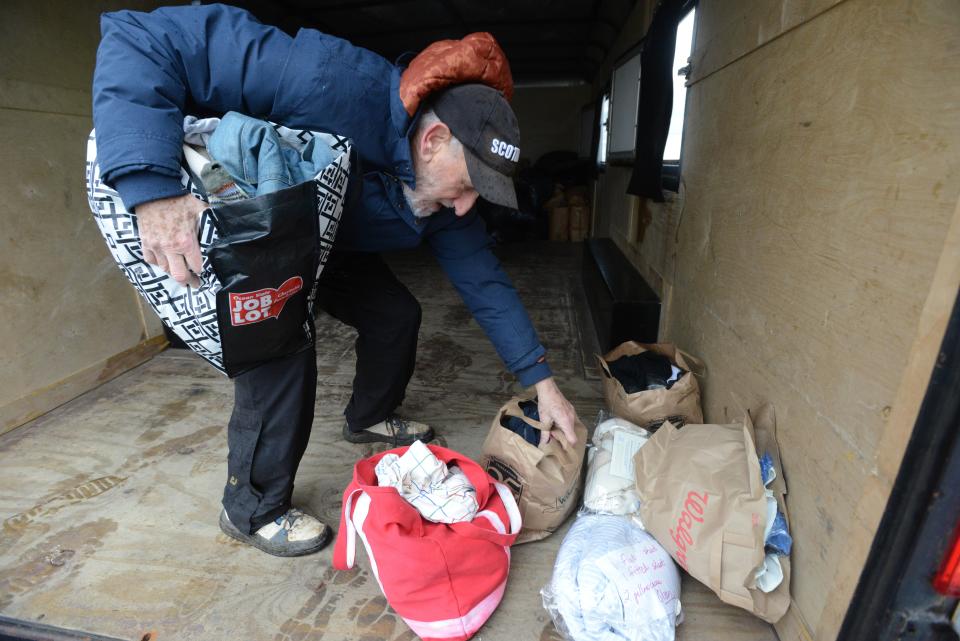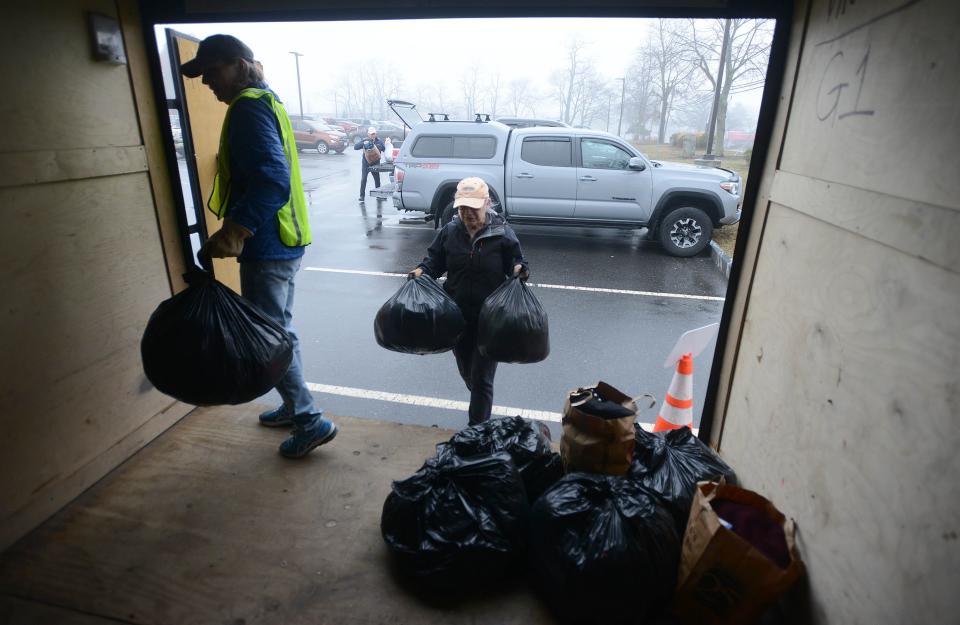Recycling is no longer optional in Falmouth. Here's what's banned from trash bins.
FALMOUTH — Recycling is about to get a big boost as the town officially begins requiring everyone — from residents to visitors, businesses to institutions — to up their game and pitch only non-recyclable waste in their trash bins.
Starting April 14, just in time for Earth Day, the town is making it mandatory to recycle all materials appearing on the state Department of Environmental Protection's waste ban list, including paper, cardboard, glass bottles and jars, and plastic and metal food and drink containers, in addition to bulky items like clothing and other textiles, mattresses, and leaves and other yard waste.
The mandatory directive has been in the works for more than two years, said Mary Ryther, Department of Public Works recycling and solid waste coordinator.

It started with getting the OK from town meeting to create mandatory recycling regulations, she said. Later, the solid waste advisory committee got town meeting approval to assign responsibility for implementing the rules to the health board, and the two panels worked closely over several working meetings. After gathering comment at public hearings and from the town counsel, the health board approved the new regulations last fall, effective April 14, 2023.
What happens if you don't recycle?
Falmouth's curbside trash and recycling contractor will "observe" materials in trash and recycling bins and can reject trash containers with too many recyclables.
Solid Waste Advisory Committee Chairman Alan Robinson on Wednesday said the town was already starting to see the results, after reopening the waste management facility at 458 Thomas B. Landers Road to residential and small- business single stream recyclables drop-off on April 10 (including cardboard).
"It's already working," he said.
Members of a family who just moved to Falmouth were the first visitors, bringing a moving truck full of emptied, broken-down cardboard boxes, he said.
Previous coverage: Climate scientists keep focus on 50th annual Earth Day
"It was also visited by some small businesses," Robinson said, "and the solid waste coordinator received a call from a construction contractor asking 'is it true I can no longer put cardboard in the construction debris roll off? I need to recycle it as a recyclable, not as construction debris?' She said 'yes.' So, tangibly, in that particular instance, material that would have just gone into a demolition debris landfill, is getting recycled."
The first hints of success, he said, are "very heartening."

Who does the mandate impact? Everyone.
The town has had a single-stream curbside recycling program since the 1990s, Ryther said. Last year its recycling rate was 21.48%.
The curbside recycling and waste removal program is funded through property taxes and is only for homes. Eligible residences were provided with 96-gallon recycling carts last July. Ryther said residents will be able to acquire a second cart to handle additional recyclable materials as a result of the new regulations.
Under the ban, commercial generators of waste and recycling who do not already contract for private recycling services will be required to do so, and trash haulers will be required to offer recycling services to all of their Falmouth customers. According to the town, these include property owners, renters, tenants, lessees, permittees, event organizers, and occupants of any commercial, industrial, institutional, nonprofit, municipal, school, mixed-use building, time-shares, or any other non-residential generators of waste in Falmouth.
Previous coverage: Cape is running out of space for trash. One solution - ship it to another state by train.
Compliance with the ban, Ryther said, will be monitored by the DPW and the town's health department. Specific details can be viewed in section 13.0 enforcement of the regulations available on the town website at www.falmouthma.gov/1400/Mandatory-Recycling-Regulations
Massachusetts aims to reduce 90% of waste by 2050.
The state has continued to expand its list of items banned from the waste stream and that must instead be recycled or reused. The latest ones, added in November, include mattresses and textiles like clothing and shoes, towels, bedding, clothing and other fabrics — with the exception of fabrics that are contaminated with hazardous substances, oil, mold, insects or bodily fluids.
The expanded ban also applies to food waste in some cases, specifically limiting the amount businesses and institutions can dispose of to a half ton weekly.
According to the state's solid waste master plan, the goal is to reduce waste over 2018 levels by 30% by 2030, and 90% by 2050.
Aside from environmental motivation, these goals are driven by dwindling options for waste disposal. It's no secret that landfill space is filling up fast across the country, and Massachusetts isn't an exception. According to the Environmental Protection Agency there are 10 operational landfills out of 50 that once operated in Massachusetts, and two "candidate" landfills. Additionally, the incinerators are working at full capacity.
Trash talk As Maine limits landfill use, Massachusetts seeks answers and trash issues pile up
So what's recyclable, and what's not?
As Falmouth begins its mandatory recycling program, Robinson and others anticipate there will be plenty of questions. And there are places to find the answers.
"There are two great resources. One is the Falmouth town website," said Robinson.
The other is an online search tool called "Recyclopedia," developed by the Massachusetts Department of Environmental Protection in collaboration with Massachusetts recycling processing facilities to provide the latest information about what and what is not recyclable. It's all part of the state's "Recycle Smart" initiative launched in 2018.
If you are unsure whether an item can be recycled, go to the Recyclopedia and type in the item in question, hit "search," and get an answer about the best way to mange the item, whether it is recycling, putting it into the trash or composting it.
Curbside and drop-off options available
The town emphasizes that Nauset Disposal will continue to pick up household recycling at curbside. For recycling pickup information visit: www.falmouthma.gov/968/Curbside-Trash-Recycling
Recyclables can also now be dropped off at the waste management facility on Thomas Landers Road.
"You can buy an annual facility sticker or a $10 daily sticker," said Robinson.
There is an additional charge of $2.50 for each 32-gallon quantity of material. Stickers can be purchased in person at the town clerk’s office, by mailing Town Clerk’s Office, 59 Town Hall Square, Falmouth, MA 02540 or requesting and paying online at https://www.falmouthma.gov/339/Online-Bill-Payment.
For information about recycling textiles and clothing, go to https://www.falmouthma.gov/1253/Textile-Recycling
The full text of the mandatory recycling regulations and additional information and FAQs can be found at www.falmouthma.gov/1400/Mandatory-Recycling-Regulations
Heather McCarron writes about climate change, environment, energy, science and the natural world, in addition to news and features in Barnstable, Brewster and Falmouth Reach her at hmccarron@capecodonline.com, or follow her on Twitter @HMcCarron_CCT
Keep connected with the Cape. Download our free app.
This article originally appeared on Cape Cod Times: If it's on the Mass. waste ban list, it must be recycled: Falmouth

